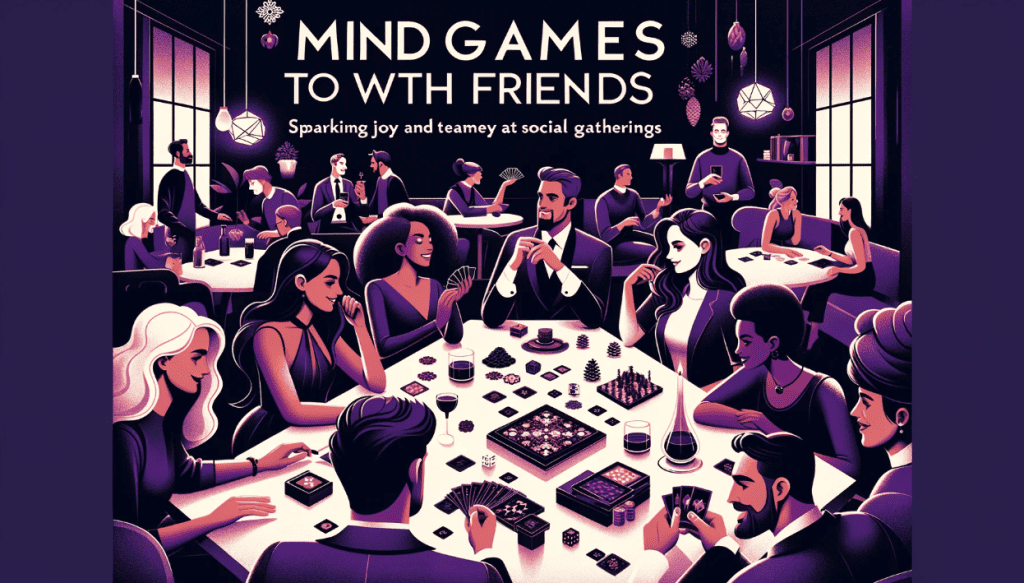Have you ever noticed how a simple game of guessing or trivia can transform a gathering of friends into a hive of excitement and laughter? That’s the magic of mind games—they aren’t just pastimes but powerful tools for bonding, strategizing, and mental sharpening. In recent times, the allure of mind games has skyrocketed, finding a place in both lounges and online lounges across the globe. They are the new social glue, bringing together friends and colleagues not just for fun, but also for the invaluable benefits of team building and cognitive development.
The world of mind games is diverse, offering a multitude of ways to challenge the intellect and cooperative skills of a group. Whether it’s decoding the master’s riddle, strategizing over a game of chess, or collectively solving a complex puzzle, these games put our minds in gear and our friendships to the test. What’s crucial is selecting the right type of game—one that encourages teamwork and friendly rivalry, fostering an environment where every participant feels included and engaged.
Introduction
Picture this: a room full of laughter, playful taunts, and the intense focus of friends engrossed in a captivating mind game. This is the scene that mind games have the power to create, transforming a simple gathering into a hub of strategic thinking and collaboration. Mind games have surged in popularity as individuals seek out more stimulating, interactive forms of entertainment. They are not just for fun; they serve as a medium for enhancing social interaction, sharpening cognitive abilities, and strengthening team dynamics.
The options are wide-ranging, from classic board games that challenge our strategic thinking to innovative puzzles that test our problem-solving skills. Whether played face-to-face or through the clicks of a keyboard in a virtual setting, these games have adapted to the times, ensuring that no matter where we are, the game can always go on. It’s vital, however, to choose games that not only entertain but also promote cooperation and friendly competition among friends. The best mind games to play with friends are those that everyone can participate in, leaving no one on the sidelines.
So, what types of mind games can you introduce at your next social gathering to guarantee an evening filled with strategic fun? Let’s unlock the world of engaging mind games for groups, where every move is a play of intellect, and every player is a partner in the grand scheme of entertainment.
The Appeal of Mind Games in Social Settings
Why do mind games resonate so deeply when we play them with friends? It’s not just the shared laughter or the competitive spirit that they evoke; it’s also the way they seamlessly weave into the fabric of our social fabric. Mind games serve as icebreakers, catalysts for connection, and platforms for intellectual growth.
- Breaking the Ice with Shared Challenges: Consider the shy smiles and hesitant starts that often mark the beginning of a social gathering. A round of charades, as highlighted in Asana’s team-building games guide, can melt away the awkwardness, encouraging participants to shed their inhibitions as they act out prompts and guess away. It’s a shared challenge that warms up the room, creating a common ground for all present.
- Critical Thinking and Mental Agility: Mind games are a workout for the brain. They compel us to engage in critical thinking and exercise our problem-solving muscles. Whether it’s strategizing the next move in a board game or solving a complex riddle, these activities promote mental agility. The brain thrives on such challenges, and when faced with the need to outthink competitors or collaborate for a common goal, our cognitive abilities sharpen.
- Fostering Teamwork Through Play: Games like charades aren’t just about guessing the right word; they’re about reading your teammates’ non-verbal cues, collaborating under time pressure, and supporting one another’s efforts. This team-building exercise mirrors the workplace environment where effective communication and mutual support are key to success.
- A Microcosm of Real-World Interactions: Play a game of mafia, and observe how quickly friends step into roles, strategize their moves, and engage in persuasion. Such mind games act as a microcosm for real-life social interactions, where understanding different perspectives, negotiating, and decision-making are part of our daily lives.
- Enhanced Communication Skills: The best mind games to play with friends often involve intense communication. Players find themselves explaining complex ideas, articulating thoughts under pressure, and listening actively to others. These are invaluable skills that translate well beyond the game table into personal and professional life.
Mind games in social settings do more than fill time; they build bridges between people, enhancing interpersonal skills and cognitive functions. They are the perfect blend of entertainment, mental stimulation, and social interaction – a combination that explains their enduring popularity and appeal.
Choosing the Right Mind Games for Your Group
Selecting the perfect mind game for your group of friends isn’t just about picking the most popular or complex option available; it’s about tailoring the experience to fit the unique blend of personalities, interests, and cognitive desires that your group embodies. Whether your gathering is large or small, full of trivia buffs or strategy aficionados, the following approach ensures that everyone finds enjoyment and intellectual stimulation in the gameplay.
- Assess Group Size and Dynamics: The number of participants dictates the flow and type of game you choose. Smaller groups might enjoy the intimacy of games like ‘The Resistance’ where betrayal and social deduction are at the forefront. Larger gatherings, however, may require games that can split into multiple teams or rounds to keep everyone involved. Outback Team Building offers a plethora of activities that are scalable to larger groups, ensuring that no one is left spectating.
- Match Game Complexity to the Group’s Intellectual Appetite: Not all mind games are created equal in complexity, and not all groups seek a cerebral challenge. It’s essential to match the game’s difficulty with the group’s intellectual appetite. A game too simple might bore the savvy puzzle-solvers, while an overly complex one could overwhelm others. Striking that balance is key to an engaging experience.
- Consider Attention Span and Engagement Levels: Some games require prolonged focus, which might not be suitable for groups that prefer quick, energetic bursts of play. Mind games that offer shorter rounds or clear checkpoints can maintain high engagement levels and prevent the dreaded game-night fatigue.
- Adaptation and Modification Keep Things Fresh: Even the most beloved games can grow stale over time. Inject new life into classic games with creative modifications. For example, traditional charades can transform into a silent movie challenge, or a typical trivia night can evolve by introducing interactive elements or physical tasks between questions.
- Prioritize Inclusivity and Accessibility: Finally, ensure that the games you select are inclusive and accessible to all participants. Consider any physical or cognitive limitations within your group and choose games that accommodate these needs or can be easily modified to do so. After all, the fun of mind games lies in their ability to bring people together in the spirit of friendly competition and collective problem-solving.
When these elements align, mind games become more than just a pastime; they turn into a bonding experience, a sharpening of wits, and a celebration of the diverse talents within your circle of friends.
Innovative Mind Games for Team Building
Team building takes a creative turn when you introduce mind games that require not just intellectual prowess but also a hefty dose of cooperation and non-verbal communication. One standout example is ‘The Mind’, as highlighted by team building expert Chris Rudram on LinkedIn. This game is a testament to the power of silent collaboration, where players must synchronize their actions without the crutch of verbal cues.
- Understanding ‘The Mind’: In ‘The Mind’, players work together to place numbered cards in ascending order on a stack, but the catch is that this must be done without speaking or signaling. Players must become attuned to one another’s timing and tendencies, fostering a deep sense of group intuition and trust.
- The Silent Strategy: The strategic element lies in the silence. Players must keenly observe each other and time their moves with precision. The tension mounts with each card played, building a shared atmosphere of focus and anticipation.
- Cohesion Through Non-Verbal Cues: The requirement for non-verbal communication in ‘The Mind’ reinforces the importance of non-verbal cues in understanding team members. This silent coordination can bridge gaps between different communication styles within a group.
SessionLab’s collection of icebreaker games further illustrates the importance of non-verbal teamwork with activities like ‘Line Up’. In ‘Line Up’, participants must arrange themselves in a specific order, such as by height or birthday month, without speaking. This exercise:
- Promotes Non-Verbal Communication: Players rely on hand signals, body language, and other forms of silent interaction to accomplish their goal, honing their non-verbal communication skills.
- Encourages Problem-Solving: With the verbal pathway closed, teams must get creative to solve the task at hand, leading to innovative solutions and approaches that might not surface in a typical conversation-driven setting.
- Builds Team Cohesion: As players work through the challenge, a sense of unity and camaraderie develops. The shared success of completing the task without words becomes a memorable bonding experience.
These types of mind games serve as powerful tools for team building, offering a playground for friends to develop trust, strategic thinking, and a deeper understanding of each other’s communication styles. They transform group dynamics by emphasizing the unspoken yet profound ways we connect with one another.
Brain Teasers for Intellectual Challenge
As we delve into the realm of brain teasers, we unlock a whole new layer of mental gymnastics that challenges both individual and group intellect. These puzzles, ranging from riddles to complex logic problems, serve as a mental workout, enhancing cognitive functions such as problem-solving, memory, and critical thinking.
- Integration into Group Dynamics: Integrating brain teasers into group settings can act as a neural catalyst, sparking synaptic connections and creating a lively atmosphere of competition and collaboration. TeamBuilding.com offers an impressive catalogue of team-building brain teasers that can turn any group gathering into a cerebral battlefield.
- The Cognitive Boost: Engaging in riddles and logic puzzles stimulates the brain, keeping minds sharp and alert. They help develop a variety of skills, including pattern recognition, hypothesis testing, and the ability to think under pressure.
- Collaborative Problem-Solving: Brain teasers often encourage collaborative problem-solving, where the collective intellect can shine. As participants contribute different perspectives and strategies, these puzzles become a conduit for social learning and shared intellectual accomplishment.
- Examples of Collaborative Brain Teasers: Envision a scenario where friends huddle over a complex riddle, each bouncing ideas off one another until the solution clicks into place. Or consider the challenge of a visual puzzle, where the group must come to a consensus on what they perceive, often leading to intriguing discussions and revelations.
- Visual Challenges: They say a picture is worth a thousand words, and in the case of visual brain teasers, this is especially true. Visual challenges can be particularly engaging, requiring the group to interpret images, spot differences, or untangle seemingly impossible optical illusions.
- The Fun Factor: Above all, brain teasers for groups are meant to be fun. They bring laughter, playful debate, and a sense of achievement that only comes from tackling and solving a problem as a united front.
By incorporating brain teasers into group activities, friends can enjoy a dynamic and interactive way to challenge their minds and build stronger connections. These mental exercises prove that the pursuit of knowledge and the joy of discovery are best shared with others.
Mind Games for Large Groups: Maximizing Engagement
When it comes to engaging large groups in mind games, the challenge lies not just in the selection of the game, but also in its execution. The goal is to captivate every participant, keeping the momentum lively and the brains buzzing. Let’s explore the strategies that ensure no one is left spectating from the sidelines.
- Diverse Game Selection: Start by choosing games that inherently support large groups. SessionLab’s large group games guide is a fountain of inspiration, offering activities designed to engage 20 or more players. These games often include elements that require collective input and encourage widespread participation.
- Breaking It Down: For larger gatherings, consider breaking the group into smaller teams. This approach not only makes management more feasible but also ensures that each individual has a significant role to play. It promotes a sense of belonging and accountability as each team strives to outperform the others.
- The Role of Facilitators: Assign facilitators or team leaders who can keep the energy up and direct the flow of the game. Their role is crucial—they act as the conductors of this symphony of minds, ensuring that every participant is tuned in and contributing.
- Adapt and Overcome: Be ready to adapt the rules to better suit large group dynamics. This might mean simplifying complex instructions or modifying game objectives to accommodate more players. Flexibility is key to maintaining engagement across the board.
- Time Management: Keep a brisk pace and be mindful of time. Larger groups mean longer wait times, which can lead to dwindling interest. By maintaining a swift pace, you ensure the game’s tempo keeps all players deeply involved and eager for their turn.
- Inclusive Game Design: Choose games that cater to a wide range of intellectual appetites and ensure that they are accessible to all participants. A game that is too complex might intimidate some, while one that’s too simple could bore others. Find that sweet spot where the challenge is just right for everyone.
- Maintain the Buzz: Keep the energy high with intermittent boosts—be it through surprise twists in the game, rewards for milestone achievements, or simply by infusing humor and playfulness into the proceedings.
The essence of mind games in large groups is not just the intellectual challenge they present but also the stir of excitement they bring to a collective. By employing these strategies, you ensure that every participant leaves the game with their spirits high and minds sharper, having fully immersed in the joy of group play.
Virtual Mind Games: Adapting to Digital Interaction
The digital revolution has ushered in a new era for mind games, transforming them into virtual experiences that friends can enjoy from anywhere in the world. Virtual gatherings have become the norm, and with them, mind games have evolved to fit this innovative landscape.
- Embracing Simplicity: The key to successful virtual mind games lies in their simplicity. Opt for games with straightforward rules that can be easily explained and understood over a video call. This ensures that everyone can jump right in without lengthy tutorials or confusion, fostering an environment where the game, not the instructions, takes center stage.
- The Versatility of Virtual Games: A plethora of mind games now thrive in the digital realm, thanks to their adaptability. The Gomada blog highlights an array of virtual brain teaser games that are perfect for this setting. These games range from classic riddles to interactive puzzles, all of which are designed to engage and challenge players in a virtual format.
- Minimal Requirements, Maximum Fun: When selecting games, prioritize those that require minimal setup or special equipment. Virtual games should rely on common household items or none at all, making it easy for anyone to participate without the need for preparation.
- Digital Tools as Game Enhancers: Leverage the power of digital platforms to elevate the gaming experience. Use screen sharing for visual puzzles, employ virtual whiteboards for collaborative challenges, and consider apps that are specifically designed for group gaming. These tools not only streamline gameplay but also add an interactive dimension that physical games cannot match.
- Keeping the Connection Strong: Ensure that the chosen platform is stable and user-friendly. A strong and reliable internet connection is crucial to avoid interruptions that can disrupt the flow and enjoyment of the game.
- Inclusivity in the Virtual Space: Remember to consider the technological comfort levels of all participants. Offer a quick run-through of the digital tools before the game begins to guarantee that everyone feels confident in navigating the virtual space.
The shift to virtual interaction has not dampened the spirit of mind games; if anything, it has expanded the horizon for these cerebral pastimes. With a focus on simplicity, inclusivity, and the clever use of digital tools, mind games continue to offer a boundless playground for strategic fun and mental agility, regardless of physical distances.
The Collective Joy of Mind Games
As we delve into the world of mind games, we uncover a treasure trove of benefits that go far beyond mere entertainment. These games serve as a conduit for enhancing relationships, sharpening cognitive abilities, and building solidarity within groups. Whether it’s the silent collaboration in ‘The Mind’ that fosters non-verbal communication skills or the challenging brain teasers that keep our mental faculties in peak condition, the advantages are manifold.
Reflect on the appeal of mind games in social settings, where the ice breaks and laughter flows freely. Games like charades, as illustrated in Asana’s team-building games guide, not only spark joy but also cultivate deeper connections among friends and colleagues. It’s in these moments of shared struggle and triumph that bonds strengthen.
When choosing mind games, consider the dynamics of your group. Will the complexity of the game align with their interests? Does it accommodate the size of the group? Recall the insights from Outback Team Building, which suggest how to adapt activities for larger gatherings, ensuring inclusivity and engagement for each participant.
As you explore innovative games for team building, remember the value of cooperation and strategic thinking. Games mentioned by Chris Rudram on LinkedIn, like ‘The Mind’, demonstrate the power of collective effort towards a common goal. Similarly, brain teasers listed on teambuilding.com can serve as a stimulating group activity, challenging both individual and collective intellect.
Mind games for large groups can be a logistical puzzle of their own. Look to resources such as SessionLab’s large group games guide for inspiration on how to manage and select games that maximize participation and enthusiasm.
In the realm of virtual gatherings, the digital transformation of mind games has been remarkable. Platforms and tools that facilitate smooth online play are crucial, as suggested by the Gomada blog’s virtual brain teaser games. The challenge lies in choosing games with simple rules and minimal requirements to make the digital experience seamless.
As we wrap up our exploration, let’s not forget the underlying thread that weaves through the fabric of mind games: the joy of shared experiences. These games are not just about winning or competition; they’re about the laughter, the ‘aha!’ moments, and the stories that will be told for years to come.
Your Experiences Matter: Now, it’s your turn to add to the narrative. What mind games have you played with friends that sparked joy and camaraderie? How have you adapted traditional games to suit your group’s unique flair? Share your stories and favorite group mind games. Your insights will contribute to a growing community of game enthusiasts, eager to learn from each other and to discover new ways to engage, connect, and play. Together, let’s continue to unlock the boundless potential of mind games to enrich our friendships, challenge our minds, and strengthen our teams.
In conclusion, mind games are more than just fun distractions; they are powerful tools for strengthening bonds, enhancing cognitive abilities, and building effective teams. Throughout this article, we have explored the diverse array of games that can be adapted to any social gathering, whether in-person or online. We’ve delved into the social benefits these games offer, the intellectual challenges they present, and the importance of choosing the right games for your group’s size and dynamic.
We encourage you to take the leap and introduce mind games into your next social event or team-building session. Experiment with the suggestions we’ve provided, from the silent teamwork required in ‘The Mind’ to the collaborative problem-solving of team-building brain teasers. Remember to keep inclusivity at the forefront of your choices to ensure that everyone can participate and enjoy.
Are you ready to see the difference mind games can make in your social interactions and teamwork? Share your experiences and favorite mind games with us, and join a community of like-minded individuals who value the power of play. Your stories can inspire others and help create a resource for anyone looking to enhance their gatherings with engaging and thought-provoking entertainment.
Don’t forget, the journey to better social connections and sharper minds is just a game away. So gather your friends, colleagues, or family members, and let the games begin!








